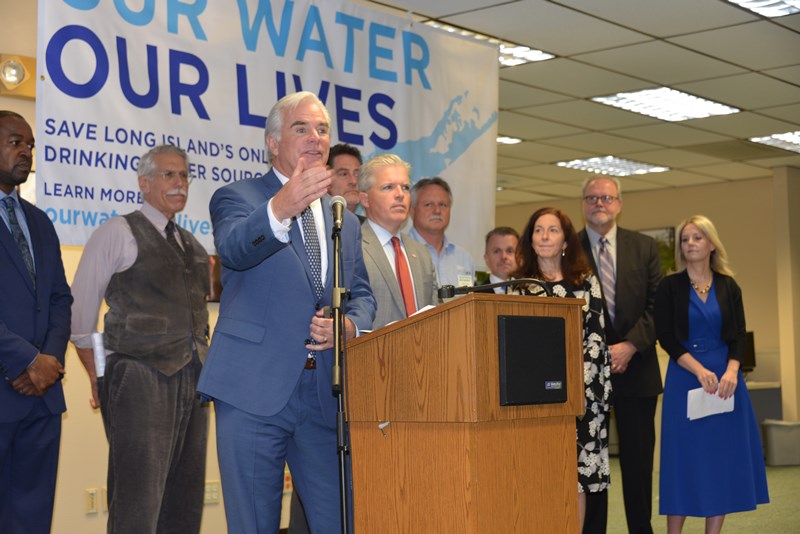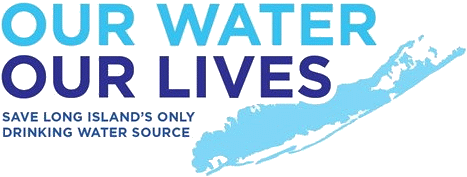CONSERVING WATER: USING OUR MOST PRECIOUS NATURAL RESOURCE EFFICIENTLY
In many parts of the United States, water conservation has become synonymous with limiting consumption and maximizing a limited resource. Here in Suffolk County, where our fresh water supply is not reaching a critical limit, these same measures are not applicable. Our focus on water conservation isn’t so much a matter of limited quantity, but instead the need to efficiently use our most precious natural resource.
Although we have a sufficient water supply to meet present and future demands if managed properly, there are many reasons why it's important to conserve water. Conserving water reduces the need for electricity to run our well pumps; reduces the need to construct new wells, water mains and tanks to meet increased demand; ensures that there will be an adequate supply for future generations; and ensures that there will be sufficient water pressure during peak demand periods for fighting fires. Conserving water also saves money.

For these reasons, and with the New York State Department of Environmental Conservation seeking a 15% reduction in peak water use, the Suffolk County Water Authority played a key role in the Long Island Commission for Aquifer Protection’s recently-unveiled “Our Water Our Lives” drinking water conservation campaign. Go to ourwaterourlives.com to learn more about the campaign and take the campaign pledge to use our precious drinking water resources more judiciously.
Here are ten easy steps to conserve water:
1) Water Your Lawn with Smart Irrigation Controllers and Rain Sensors. It’s never been easier to have technology help you determine when your lawn needs to be watered Rain sensors and smart irrigation controllers make sure lawns only get watered when they actually need it, eliminating wasteful overwatering and saving you money.
2) Water Less Often. Your lawn only needs an inch and a half of water per week, so if it rains, there may be no reason to water at all. If it doesn’t rain, go to an odd/even day watering system or other method that helps avoid the one thing everyone agrees on: lawns should not be watered every day.
3) Use EPA WaterSense Products. More water is used in your bathroom than anywhere else in your home. You can make your bathrooms much more water efficient with products bearing the WaterSense label like toilets, shower heads and faucets. Using WaterSense products anywhere inside or outside of your home will save you money and help save Long Island’s aquifers.
4) Shorten your Showers. Showers can use up to 6.5 gallons of water per minute. So let’s keep our showers short and sweet!
5) Brush your Teeth…in Silence. Once you moisten your toothbrush, there’s no reason to leave the tap running as you brush unless you like wasting water and money! Turn off the tap while brushing and turn it back on when you’re ready to rinse. You’ll save more than a gallon of water per minute.
6) Fully Load your Washers before Using. Whether it’s a load of whites or a stack of dirty dishes, running your washing machine or dishwasher only when they’re full will help save Long Island millions of gallons of water each year.
7) Don’t Hose it off if Another Tool Will Work. It’s really tempting to use the garden hose to wash away leaves, dust and other debris. It’s also incredibly wasteful. Use a rake, broom or shovel instead of the hose whenever possible.
8) Fix a Leak. That drip, drip, drip coming from your sink might not bother you that much, but it could be wasting gallons of water each day. Cumulatively, every tiny leak on Long Island could be wasting MILLIONS of gallons of water each year! So, get out your wrench, Google how to fix it, or call your local plumber and help save our water supply.
9) Keep your Plants Moist with Mulch. In addition to only watering your lawn when it needs it, you’ll need to water the plants around your home less with quality mulching. Mulch also provides nutrients, reduces run-off and helps fight weeds.
10) Go to the Car Wash. Today’s car washes are specifically designed to recycle water and be as efficient as possible, so please visit your local car wash instead of washing at home.
